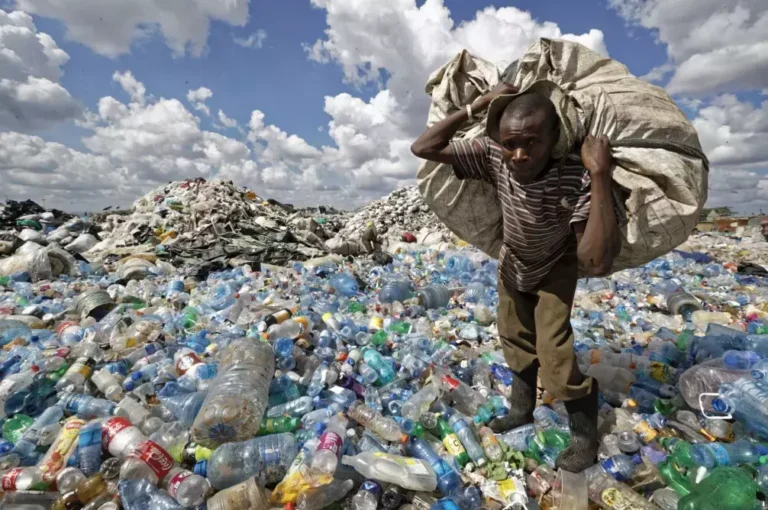By Trésor Daniel MEFIRE
As the world barrels toward producing 460 million tonnes of plastic annually by 2025, a growing wave of plastic waste is choking oceans, poisoning human bodies, and threatening African economies—sparking what researchers now call a full-blown environmental emergency.
In a scathing new report, environmental researcher Trésor Daniel MEFIRE warns: “Plastic pollution is not just an environmental issue—it’s a failure of global systems prioritizing profit over planet.” His comprehensive review sheds light on the staggering scale of the crisis, its devastating impact on Africa, and the urgent need for systemic change.
Microplastics in Our Bloodstreams
Plastics have permeated every layer of Earth’s ecosystems—and even the human body. Recent studies cited by MEFIRE reveal microplastics have been detected in blood and placental tissue, with people ingesting up to 5 grams of plastic weekly—the weight of a credit card. The long-term health implications remain uncertain but deeply concerning, with links to inflammation, endocrine disruption, and possibly neurodegenerative diseases.
Oceans, Landfills, and Corporate Pollution
Globally, oceans are now home to 75–199 million tonnes of plastic. The infamous Great Pacific Garbage Patch—larger than Iran—continues to trap marine life in floating waste. Shockingly, less than 9% of all plastic ever produced has been recycled, while single-use plastics—mainly from fossil fuels—dominate production.
“In 2019 alone, 130 million metric tonnes of single-use plastics were manufactured. Now, major corporations plan to increase production by 30% by 2025,” MEFIRE notes, referencing the looming flood of an additional one trillion plastic items.
Africa’s Mounting Crisis
Africa, generating over 17 million tonnes of plastic waste annually, is recycling under 10%. Countries like Nigeria, Egypt, and South Africa are among the continent’s worst marine plastic polluters. MEFIRE highlights informal settlements in Lagos and Nairobi as particularly vulnerable, where blocked drains and plastic-clogged streets fuel floods and disease outbreaks.
Exacerbating the crisis is illegal dumping by Western countries, with containers of mislabeled “recyclables” flowing into African ports. “Without urgent intervention, plastic pollution could cost Africa $50 billion in environmental damages by 2040,” MEFIRE cautions.
Environmental, Economic, and Social Fallout
Plastic pollution is killing over one million seabirds and 100,000 marine mammals annually. It’s also an economic anchor, reducing fishery yields, wrecking tourism, and draining infrastructure budgets. Nigeria alone loses $4 billion yearly due to flooding caused by plastic-blocked drains.
Women and children are hardest hit. In Senegal, female waste pickers suffer respiratory illnesses from burning plastic waste yet earn less than $2 daily. In Ghana’s slums, children are 50% more likely to fall sick in plastic-polluted environments.
Turning the Tide: Innovations From Below
Despite the bleak picture, grassroots innovation is emerging across Africa:
- In Cameroon, startups like EcoCycle produce over 3,000 plastic bricks daily for schools and hospitals.
- The “Plastic for Eggs” program incentivizes rural recycling by letting farmers exchange plastic waste for poultry products.
- Yaoundé is set to launch its first plastic-to-fuel plant in 2025, capable of processing 50 tonnes of waste daily.
MEFIRE highlights these examples as proof that local ingenuity is outpacing sluggish government enforcement.
Beyond Cameroon, the continent is experimenting with plastic roads, waste-to-fuel technologies, and youth-led cleanup movements. Apps like Nigeria’s RecyclePoints recover thousands of tonnes annually through digital incentives.
Policy Shifts and the Road Ahead
While community efforts grow, MEFIRE underscores the need for stronger policies. The African Union’s Plastic Action Plan now mandates Extended Producer Responsibility laws in over 30 nations. Malawi’s crackdown on plastic bag smuggling has already slashed usage by 70%.
Still, loopholes remain. “Policies must also ban plastic waste imports, as Europe continues to offload its trash on African soil,” MEFIRE warns.
The Clock Is Ticking
The report concludes on a sobering note: “If plastic production isn’t slashed, recycling alone will fail. By 2050, plastic emissions could consume 15% of Earth’s carbon budget.” MEFIRE insists global action must include binding treaties, massive investment in circular economies, and corporate accountability.
The choice, he says, is stark: “End the plastic era, or let it end us.”
Editor’s Note:
This report, authored by Trésor Daniel MEFIRE and published by The North Journals, offers a comprehensive analysis of the escalating plastic pollution crisis, with a particular focus on Africa’s environmental, economic, and public health vulnerabilities. For an in-depth exploration of the findings, case studies, and policy recommendations, click here to access the full PDF. Plastic pollution
